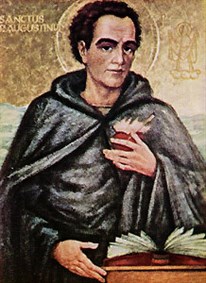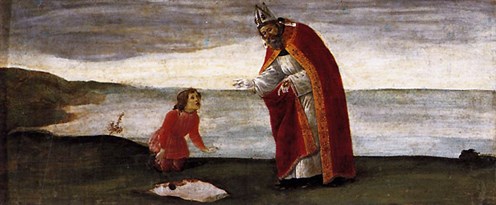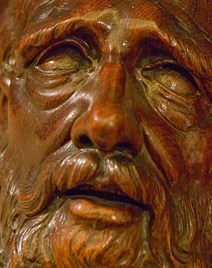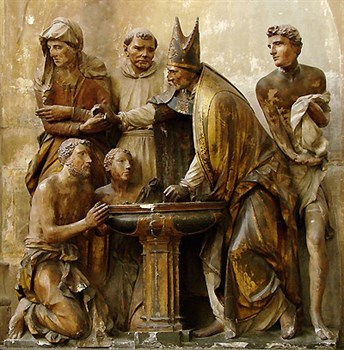St Augustine and Friendship

Fr M Morahan OSA
This talk by the late Fr Michael Morahan O.S.A. of the Australian Province was given to Augustinian seminarians in Seoul, South Korea in 1993.
Friendship is something very important to most people. In fact St Augustine believed that in this world two things are essential: life and friendship. God created people to breathe and be alive. But mere life is not enough: if a human being is to be a real person then there must be friendship.
I was speaking to a psychiatrist friend last year and he was telling me how much he sees that people need friendship. He compared it with food. Just as for our body, without appropriate food for our soul we become sick. Our healthy interaction with others, especially our friends, is one of the foods our soul needs. We find the same message in many books on psychology today.

St Augustine, Bishop of Hippo
An understanding of this is especially important for us. St Augustine warned his monks from being so devoted to study and prayer that they forgot the needs of the brothers (City of God, Bk XIX, 19). His idea for a ‘monk’ was unlike that of his time. He did not see the monk as one who went out alone into the desert but one who sought God with his brothers and was one with them.
We often think we understand concepts which are familiar to us. Sometimes we do not give them a thought precisely because they are so familiar. Sometimes these familiar concepts need turning over like soil before seeds are planted. Friendship is one of these: it is so common and yet it really deserves reflection.
Augustine himself did this. He read what others such as Cicero had to say about friendship. He reflected on friendship but not merely in an intellectual manner. Friendship was so important a part of his life.
He made mistakes in friendships. He was also a good and close friend to many, not just those who were members of his community. This experience as well as what he read and his faith were all part of his reflection.
We will look today at St Augustine’s experience of friendship so that we can better understand a concept which is so familiar. However if we are to follow Augustine’s example then we must not restrict our reflection to an intellectual exercise. We need to evaluate what we hear and ask what significance it has for our lives. We will look at what Augustine tells about his friendships at three stages in his life: adolescence, early adulthood and adulthood. These will help us deepen our understanding of the meaning of friendship.
1: Adolescence: self-centred friendship
There is a kind of friendship which is based on solely on companionship (cameraderie -chinmok?). It involves getting along with someone. It may often involve taking advantage of someone. We can indeed find companions whose company we enjoy very much or who gives us something – access to things we may not have -such a friendship can be our downfall. In fact it is not true friendship. It can lead us in the wrong direction. We may even end up giving up what we really believe in just to please the other person and maintain our own enjoyment and the approval of so-called friends. This kind of friendship really focuses on ourselves and what we are getting out of our so called friend.
Augustine tells us about this kind of friendship. It was the kind of friendship he sought in adolescence. He says he was more in love with love than with any one: The single desire that dominated my search for delight was simply to love and to be loved. Confessions Bk II Ch I (Para 2)

Augustine and child on the sea shore (AU730)
Notice his focus is on himself. Who or what he loves is not important. His friendship that involved him in a gang was of this kind. He wanted to be accepted. Read the story of the stealing of the pears later and think about the question ‘When are my friendships like those of his adolescence?’
He says that he was encouraged to boast about his own sexual pursuits (even when they were imaginary) and the actual pursuit of sexual deeds by this kind of friendship. (see Confessions Bk II para7.)
2: Young Adulthood: Love is the basis of Friendship
True friendship is not based on thinking about ourselves and what the other person can do for us. It is based on common concerns and values. We know we can share what we really feel, what we really are and what we really care about with true friends. Thus we can really only be true friends to each other in so far as we can share some common commitments.
Real friendship has a different direction to that of the adolescent since it takes us out of ourselves and gives us a sense of freedom. In his young adulthood Augustine experienced this new kind of friendship based on love. In particular he had one friend who was his own age and also a teacher. We do not know the name of the friend but we know that he was very dear to Augustine. They had grown up together as children and when Augustine returned to his home town, Tagaste, to teach they became close friends. Let us hear what Augustine says about friendship as he experienced with this friend and others at that time:
Friendship had other attractions which were very important to me – we could talk and laugh – help each other in small ways – we enjoyed doing lots of things together – reading some book – going somewhere -sometimes we would be very serious together – sometimes we were able to act the fool together. Sometimes when we argued with each other it was not a bitter argument but like the kind of argument you might have with yourself. In fact sometimes the argument was the kind only friends can have when they have some disagreement – it sometimes made our usual harmony more meaningful. Each of us had something to learn ‘ from each other and something to each in return. If someone was absent for some time they were missed and we welcomed them back warmly. (Confessions Bk IV Ch viii Para 14)

Wood carving of Augustine (AU732)
The measure of a true friendship is not what we can get out of it but whether it leads us to the appreciation of our friends in their totality. St Augustine believed that in our deeper friendships our interest must be in all of the other person. What does that mean? Well we are not just interested in that woman because she is very attractive or in some man because he has lots of spare money which he spreads around. Instead we are interested in all aspects of them.
When we take the whole person into account we may find that friendship really is not possible. This person might be a great musician and that is what has attracted me but if I take into account how he or she is otherwise I may find that’s where my interest stops. If that is so, we need to realise that we are not a true friend to that person and maybe we cannot be. Our interest might only be selfish. It often is if our friendship is one-dimensional.
This friend of Augustine died suddenly. His death is so traumatic for Augustine that he could not stay in his home town of Tagaste since he saw his friend everywhere he goes. So much so that Augustine had to move to Carthage and begin teaching there instead. With that begins a long path to his conversion and another transformation in his understanding of friendship. As Augustine says, he loved his friend as though he would never die and when he did die, he was distraught. Even reading what he wrote twenty years after it happened we sense his agony. We will see that as yet there is still something missing from his understanding of friendship. In fact he leaves Tagaste ‘in a state of complete dejection. Friendship is an enigma to him. He could not live without it, yet its transitory nature filled him with despair.’ (McNamara1964, 118)
3. Adulthood – Friends in Christ
In adulthood, Augustine’s life was transformed by his conversion to faith in Jesus Christ and trust in God. He no longer sees the world as purely material. True reality is only understood when we know of God who is transcendent. Once converted he seeks to gather his friends together so that they can seek God together. First at Cassiacum then on his return to Africa at Tagaste and eventually at Hippo he draws others together in friendship so that they might seek God together. They are to be friends in Christ: ‘Love has drawn you here; but love of what: If of me, this too is good, for I desire to be loved by you, but not for myself. Since, therefore, I love you in Christ, do you in return love me in Christ, and let our love for each other sigh and groan to God.’ ( In Jo. Ev. VI, 1)
At Cassiacum, in Italy, and then when he returns to Tagaste the group was primarily the friends he knows. As Tagaste and then especially at Hippo, Augustine invites others to join him who were not already his friends. But he invites them to friendship in the monastery. His concept of friendship is changing again. For he now understands that all Christian people are called to be ‘friends in Christ’. He works to build up a spirit of fraternal affection and support in the monastery and invites all there to share in that friendship which seeks God together. Christ is the first brother. His dream is that in the end there be but one Christ loving himself. This is his dream for his monastic community, for his diocese, for the Church and for the world. Therefore his friendship is not confined to the monastery. In fact, he has many friends: ‘bishops and lay people, men and women, those who are his own age and those who are much older and much younger.
While he greatly loves the presence of his close friends he in now ready to part with them for the greater good of Christ. Alypius, his close friend, who is by his side in the garden in Milan at his conversion follows him to Tagaste and to Hippo. Augustine calls him ‘the brother of his heart’. (Ep 22, 1) (see McNamara 1964, 129) Finally Alypius is also called to be bishop. Though it means losing him as a day to day companion, Augustine is now happy to let him go for he sees the goal of their friendship as sharing the love of Christ between all people. By being a bishop Alypius will bring this about even if it means his absence.

Bronze art of Augustine baptizing (AU731)
LOVE
The main conclusion we can draw from St Augustine is that friendship is based on love. It is not based on self interest. Ultimately for Christians in is based on the love of Christ. Augustine, with St John the Evangelist, believes that the way we make our love of God real is by loving. Our friendships are part of our loving God and our way to salvation.
FRANKNESS
There are a lot of misconceptions about friendship. One is that we should only praise and express our appreciation of our friends. But real friends are those we can trust, those with whom we can be sincere, not those we need to flatter all the time. If they are true friends we must be able to point out their faults or mistakes, not to score a point or to make my own life more comfortable, but so that they can gain by our insight. This is something others may not be able to do because they do not know them as well as we do. St Augustine says I true friend is not one who flatters, by who dares to tell us the truth. People sometimes do one another a great deal of harm, because they are afraid to displease. In this respect it is often our enemies who occasionally in a burst of anger who may tell us the truth about something. Unfortunately we may find it too easy to brush aside what someone we do not like tells us.
PRAYER
It the heart of friendship is wishing the other well. That is that all that is good will happen to them. Part of friendship then is that prayer for our friends. Augustine frequently wrote to his friends and often completed his letters asking for their prayers in particular situations. These are not empty formulas to end a letter but are heart-felt pleas. Sometimes we find friends are in particular difficulties and we do not know how to help them. This can often be the case if they find themselves in moral difficulties or in problems with other relationships in their lives. In these cases we may need to simply entrust them to God. God who knows the true needs of our friends far better than we will do what is best for them.
OPENNESS TO THE WORLD
Finally what is it about friendship which changes our life? Why do we enjoy it so much? Well one reason is that life without friends is like crawling through a dark narrow and twisting tunnel. All you see is what is in front of you. If you have true friends you can share what happens to you. Even familiar things come alive sometimes when you share them with friends. It is more like walking along a broad highway were you can see all the countryside around you.
Finally a question: Can you think of anything which could bring you more happiness than friendship or the trust in and care for good friends and their trust and care for us? en527

